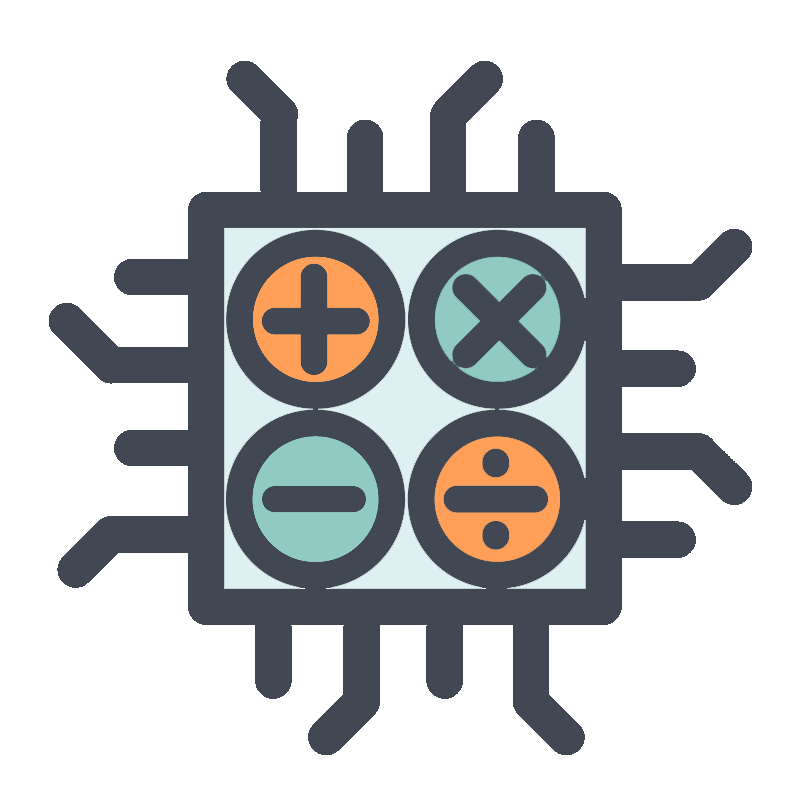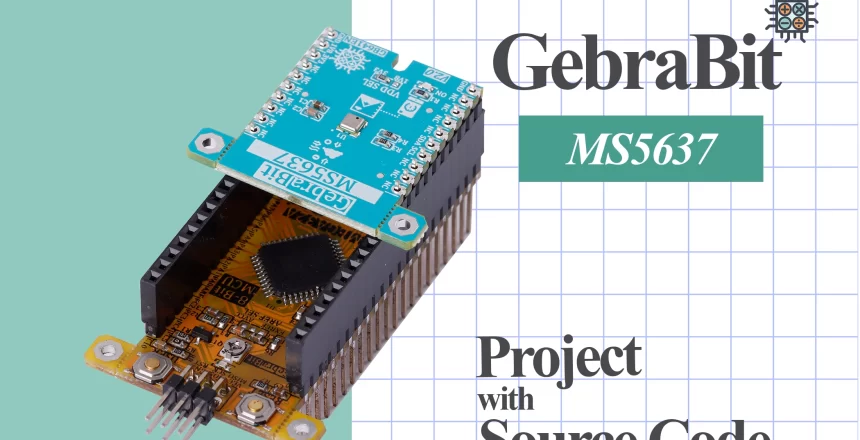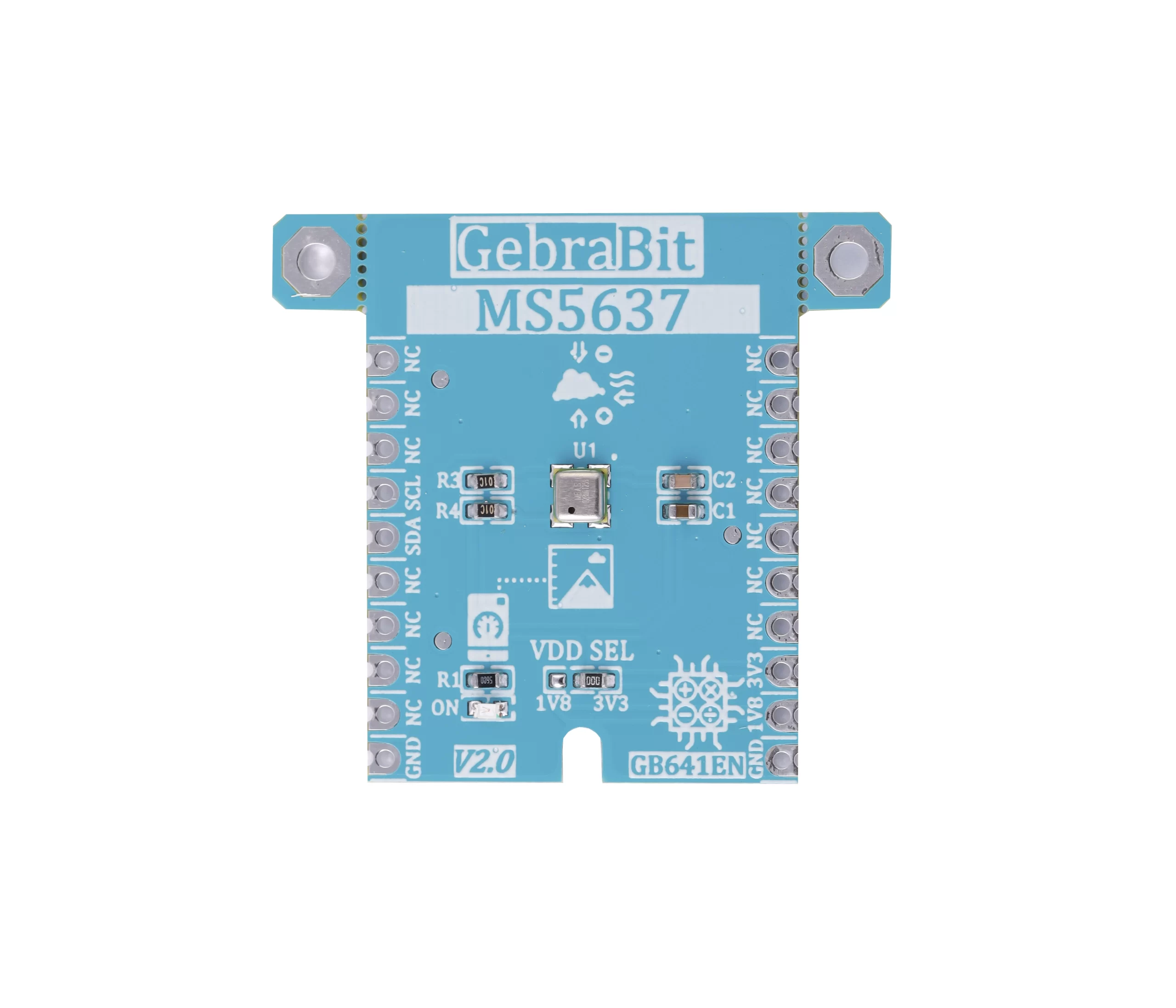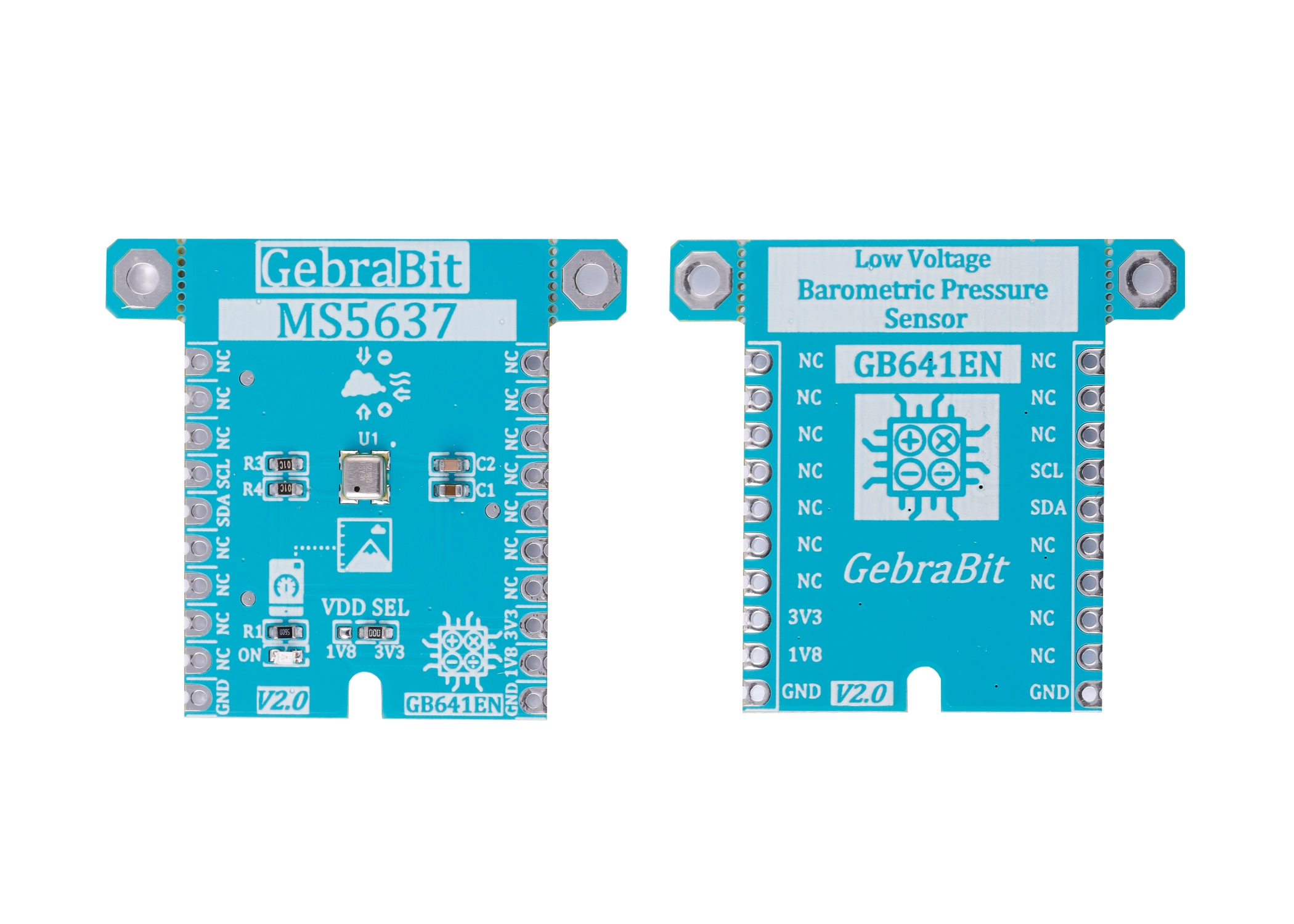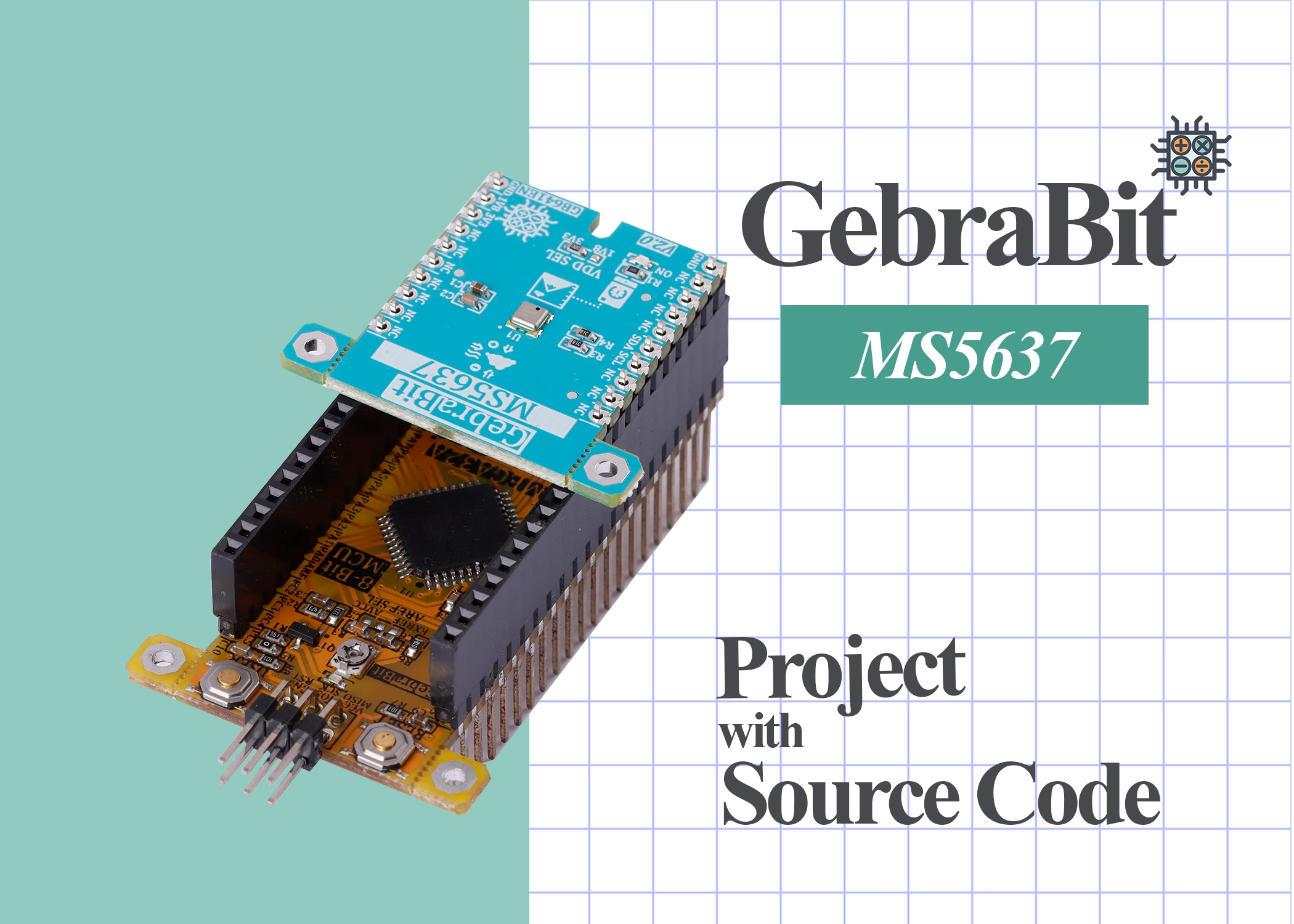What's the purpose of this project?
In this section, we are going to launch the MS5637 sensor using ARM microcontroller, STM32F series. In order to use more conveniently and optimally in this project, we use two ready modules GB641EN and GebraBit STM32F303. These two modules contain the minimum necessary elements of the MS5637 sensor and the STM32F microcontroller, which are provided by the GebraBit team to facilitate the work.
What are we going to learn in this tutorial?
In this tutorial, in addition to setting up and using the MS5637 sensor, you will get to know all the MS5637 sensor registers, how to set the various parts of the STM32 microcontroller to set up this sensor using the I2C protocol, how to use the GB641EN module specific library and driver file. You will also learn how to declare functions and finally receive sensor data in the Keil compiler.
What do we need to start this project?
As you probably know, we need some hardware and software to do this project. The titles of these hardware and software are provided to you in the table below and you can prepare/download by clicking on each of them and get ready to start.
|
Required hardware
|
Required software
|
|---|---|
|
Keil compiler
|
|
|
STM32CubeMX program
|
|
|
ST-LINK/V2 programmer
|
First, as shown in the image below, we connect the GebraBit MS5637 module to the GebraBit STM32F303 module as follows:

Note: Considering that the PA14 pin of the GebraBit STM32F303 microcontroller module is used to program the microcontroller, the I2C setting on the PA14 and PA15 pins is not possible in this version, so the GebraBit MS5637 module cannot be placed as a pin to pin on the GebraBit STM32F303 microcontroller module.
Finally, we will see the values of temperature, pressure and approximate height in Real Time in the “Watch1” window of the Keil compiler in the “Debug Session” mode.
STM32CubeMX settings
In the following, we review the settings related to each of the “I2C”, “RCC”, “Debug”, and “Clock” sections in the STM32F303 microcontroller to develop the GebraBit MS5637 module.
RCC settings
Due to the presence of “8Mhz” crystal in the GebraBit STM32F303 module, we select the “external clock” in the “RCC” section:

Debug & Programming settings
Regarding the access to “SWCLK” and “SWDIO” pins in the GebraBit STM32F303 module, to reduce the number of pins during “Debug & Programming”, in the “SYS” block, we select the “Serial Wire” option in the “Debug” section:

I2C settings
To communicate with the GebraBit STM32F303 module through I2C, select Standard Mode and select PB8 and PB9 pins as SCL and SDA:

According to the sensor data sheet, the settings of the I2C parameters in the “Parameter Settings” section will be set as shown in the above image.
Clock settings
The “clock” settings for each part of the STM32F303 microcontroller in this code, are as follows:

Project Manager settings
“Project Manager” settings are as follows, here we have used “MDK-ARM” version “5.32” compiler:

After completing all the above settings, we can develop our code easily just by one click on “GENERATE CODE” and adding the MS5637 library and driver (provided by GebraBit).
You can download the “STM32Cube MX”, “library”, “driver” and KEIL project at the end of this tutorial.

MS5637 library and driver
In addition to the modular design of various sensors and ICs, GebraBit tries to provide variety of structured and hardware-independent libraries in C language for the ease of users in setting up and developing software.
For this purpose, after preparing each GebraBit module, the users can refer to the “tutorial” section of the desired module and download the dedicated library, which contains the “ .h” and “ .c” file (Header and Source) and a sample training program under “GebraBit STM32F303”, “GebraBit ATMEGA32A” or “Arduino” development boards.
All the defined functions and structures in the library are commented in full detail and all the received parameters in the arguments of the functions and their return values, are briefly explained. Since the libraries are hardware independed, the user can easily add the library in any of their favorite compilers and develop it by desired microcontroller and development board.
GebraBit MS5637.h header file
In this file, based on the datasheet of the sensor or IC, all address registers, the values of each register are defined in the form of “Enumeration”. Also, the casing of the MS5637 sensor and the configurations related to each of the MS5637 sensor internal blocks are defined in the form of a “STRUCT” with the name GebraBit_ MS5637. Finally, in the Debug Session environment, all the configurations related to each block can be seen in real time.
USER REGISTER MAP
The registry map or sensor commands are defined in this section:
1. /************************************************
2. * USER REGISTER MAP *
3. ***********************************************/
4. #define MS5637_RESET (0x1E)
5. #define MS5637_PRESSURE_SAMPLING_START (0x40)
6. #define MS5637_TEMPERATURE_SAMPLING_START (0x50)
7. #define MS5637_ADC_READ (0x00)
8. #define MS5637_PROM_READ (0xA0) ////0xA0 TO 0xAE
9. #define MS5637_ADD 0x76 /* I2C Address */
10. #define MS5637_WRITE_ADD 0xEC
11. #define MS5637_READ_ADD 0xED
12. #define MS5637_I2C &hi2c1
13. /*----------------------------------------------*
14. * USER REGISTER MAP End *
15. *----------------------------------------------*/
16. /************************************************
17. * Register Values Begin *
18. ***********************************************/
19. #define MS5637_OSR_256_CONVERSION_TIME 1
20. #define MS5637_OSR_512_CONVERSION_TIME 2
21. #define MS5637_OSR_1024_CONVERSION_TIME 3
22. #define MS5637_OSR_2048_CONVERSION_TIME 5
23. #define MS5637_OSR_4096_CONVERSION_TIME 9
24. #define MS5637_OSR_8192_CONVERSION_TIME 17
25. #define ADC_DATA_BUFFER_SIZE 3
26. #define PROM_DATA_BUFFER_SIZE 14
27. #define SEA_LEVEL_PRESSURE 101325
28. /*----------------------------------------------*
29. * Register Values End *
30. *----------------------------------------------*/
31.
MS5637_Output_Sample_Rate Enum
The values of this enum are used to select the OSR of the sensor:
1. typedef enum Output_Sample_Rate
2. {
3. OSR_256 = 0x00 ,
4. OSR_512 = 0x02 ,
5. OSR_1024 = 0x04 ,
6. OSR_2048 = 0x06 ,
7. OSR_4096 = 0x08 ,
8. OSR_8192 = 0x0A
9. } MS5637_Output_Sample_Rate;
MS5637 struct
1. typedef struct MS5637
2. {
3. uint8_t Register_Cache;
4. MS5637_Output_Sample_Rate PRESSURE_SAMPLE_RATE;
5. MS5637_Output_Sample_Rate TEMPERATURE_SAMPLE_RATE;
6. uint8_t PROM_DATA[PROM_DATA_BUFFER_SIZE];
7. uint16_t C1;
8. uint16_t C2;
9. uint16_t C3;
10. uint16_t C4;
11. uint16_t C5;
12. uint16_t C6;
13. uint16_t CRC_SERIAL_CODE;
14. uint8_t ADC_DATA[ADC_DATA_BUFFER_SIZE];
15. uint32_t ADC_RAW_PRESSURE;
16. uint32_t ADC_RAW_TEMPERATURE;
17. int32_t DT;
18. int64_t T2;
19. int64_t OFF2;
20. int64_t SENS2;
21. int64_t OFF;
22. int64_t SENS;
23. float TEMPERATURE;
24. float PRESSURE;
25. double ALTITUDE;
26. }GebraBit_MS5637;
Declaration of functions
At the end of this file, all the functions for reading and writing in MS5637 registers, sensor configuration and receiving data from the sensor are declared:
1. /********************************************************
2. * Declare Read&Write MS5611 Register Values Functions *
3. ********************************************************/
4. extern void GB_MS5637_Burst_Read(uint8_t regAddr, uint8_t *data, uint16_t byteQuantity);
5. extern void GB_MS5637_Write_Command( uint8_t cmd);
6. /********************************************************
7. * Declare MS5611 Configuration Functions *
8. ********************************************************/
9. extern void GB_MS5637_Soft_Reset ( GebraBit_MS5637 * MS5637 ) ;
10. extern void GB_MS5637_Read_PROM ( GebraBit_MS5637 * MS5637 ) ;
11. extern void GB_MS5637_Read_Factory_Calibrated_Data ( GebraBit_MS5637 * MS5637 ) ;
12. extern void GB_MS5637_Pressure_Sample_Rate(GebraBit_MS5637 * MS5637 , MS5637_Output_Sample_Rate rate) ;
13. extern void GB_MS5637_Temperature_Sample_Rate(GebraBit_MS5637 * MS5637 , MS5637_Output_Sample_Rate rate) ;
14. extern void GB_MS5637_Start_Pressure_Sampling(GebraBit_MS5637 * MS5637) ;
15. extern void GB_MS5637_Start_Temperature_Sampling(GebraBit_MS5637 * MS5637) ;
16. extern void GB_MS5637_initialize( GebraBit_MS5637 * MS5637 ) ;
17. extern void GB_MS5637_Read_ADC ( GebraBit_MS5637 * MS5637 ) ;
18. extern void GB_MS5637_Read_ADC_Raw_Pressure(GebraBit_MS5637* MS5637) ;
19. extern void GB_MS5637_Read_ADC_Raw_Temperature(GebraBit_MS5637* MS5637) ;
20. extern void GB_MS5637_Calculate_Temperature(GebraBit_MS5637* MS5637) ;
21. extern void GB_MS5637_Calculate_Temperature_Compensated_Pressure(GebraBit_MS5637* MS5637) ;
22. extern void GB_MS5637_Altitude(GebraBit_MS5637 * MS5637);
23.
GebraBit_ MS5637.c source file
In this file, which is written in C language, all the functions are commented in full detail, and all the parameters received in the arguments of the functions and their return values are clearly explained so we confine to these explanations and invite users to check this file directly for more information.

Sample program in Keil
After making the Keil project by STM32CubeMX and adding the “GebraBit_ MS5637.c” library provided by GebraBit, we will examine the “main .c” file of the sample tutorial and view the output of the GebraBit_MS5637 module in the “watch” part in the Keil compiler “Debugging” environment.
Description of “main.c” file
If you look carefully at the beginning part of the “main.c” file, you will notice that the “GebraBit_ MS5637.h” header has been added to access the GebraBit MS5637 module required structures, Enums and functions. In the next part, a variable named MS5637_Module of the GebraBit_MS5637 structure type (this structure is in the GebraBit_MS5637 header and is explained in the GebraBit_ MS5637 library description section) is defined for the configuration of the GebraBit MS5637 module:
/* Private typedef -----------------------------------------------------------*/
/* USER CODE BEGIN PTD */
GebraBit_MS5637 MS5637_Module;
/* USER CODE END PTD */
In the next section of the written code, we initialize the GebraBit MS5637 module using the GB_MS5637_initialize (&MS5637_Module) function, and finally, in the while part of the program, the data is read from the sensor and the pressure, temperature, and height values are continuously received:
1. while (1)
2. {
3. /* USER CODE END WHILE */
4. /* USER CODE BEGIN 3 */
5. GB_MS5637_Calculate_Temperature(&MS5637_Module);
6. GB_MS5637_Calculate_Temperature_Compensated_Pressure(&MS5637_Module);
7. GB_MS5637_Altitude(&MS5637_Module);
8. }
9. /* USER CODE END 3 */
10. }
11.
The “main.c” file code text:
1. /* USER CODE BEGIN Header */
2. /*
3. * ________________________________________________________________________________________________________
4. * Copyright (c) 2020 GebraBit Inc. All rights reserved.
5. *
6. * This software, related documentation and any modifications thereto (collectively “Software”) is subject
7. * to GebraBit and its licensors' intellectual property rights under U.S. and international copyright
8. * and other intellectual property rights laws.
9. *
10. * GebraBit and its licensors retain all intellectual property and proprietary rights in and to the Software
11. * and any use, reproduction, disclosure or distribution of the Software without an express license agreement
12. * from GebraBit is strictly prohibited.
13.
14. * THE SOFTWARE IS PROVIDED "AS IS", WITHOUT WARRANTY OF ANY KIND, EXPRESS OR IMPLIED, INCLUDING BUT
15. * NOT LIMITED TO THE WARRANTIES OF MERCHANTABILITY, FITNESS FOR A PARTICULAR PURPOSE AND NON-INFRINGEMENT IN
16. * NO EVENT SHALL GebraBit BE LIABLE FOR ANY DIRECT, SPECIAL, INDIRECT, INCIDENTAL, OR CONSEQUENTIAL DAMAGES,
17. * OR ANY DAMAGES WHATSOEVER RESULTING FROM LOSS OF USE, DATA OR PROFITS, WHETHER IN AN ACTION OF CONTRACT,
18. * NEGLIGENCE OR OTHER TORTIOUS ACTION, ARISING OUT OF OR IN CONNECTION WITH THE USE OR PERFORMANCE
19. * OF THE SOFTWARE.
20. * ________________________________________________________________________________________________________
21. */
22. /**
23. ******************************************************************************
24. * @file : main.c
25. * @brief : Main program body
26. * @Author : Mehrdad Zeinali
27. ******************************************************************************
28. * @attention
29. *
30. * Copyright (c) 2022 STMicroelectronics.
31. * All rights reserved.
32. *
33. * This software is licensed under terms that can be found in the LICENSE file
34. * in the root directory of this software component.
35. * If no LICENSE file comes with this software, it is provided AS-IS.
36. *
37. ******************************************************************************
38. */
39. /* USER CODE END Header */
40. /* Includes ------------------------------------------------------------------*/
41. #include "main.h"
42. #include "i2c.h"
43. #include "gpio.h"
44.
45. /* Private includes ----------------------------------------------------------*/
46. /* USER CODE BEGIN Includes */
47. #include "GebraBit_MS5637.h"
48. /* USER CODE END Includes */
49.
50. /* Private typedef -----------------------------------------------------------*/
51. /* USER CODE BEGIN PTD */
52. GebraBit_MS5637 MS5637_Module;
53. /* USER CODE END PTD */
54.
55. /* Private define ------------------------------------------------------------*/
56. /* USER CODE BEGIN PD */
57. /* USER CODE END PD */
58.
59. /* Private macro -------------------------------------------------------------*/
60. /* USER CODE BEGIN PM */
61.
62. /* USER CODE END PM */
63.
64. /* Private variables ---------------------------------------------------------*/
65.
66. /* USER CODE BEGIN PV */
67.
68. /* USER CODE END PV */
69.
70. /* Private function prototypes -----------------------------------------------*/
71. void SystemClock_Config(void);
72. /* USER CODE BEGIN PFP */
73.
74. /* USER CODE END PFP */
75.
76. /* Private user code ---------------------------------------------------------*/
77. /* USER CODE BEGIN 0 */
78.
79. /* USER CODE END 0 */
80.
81. /**
82. * @brief The application entry point.
83. * @retval int
84. */
85. int main(void)
86. {
87. /* USER CODE BEGIN 1 */
88.
89. /* USER CODE END 1 */
90.
91. /* MCU Configuration--------------------------------------------------------*/
92.
93. /* Reset of all peripherals, Initializes the Flash interface and the Systick. */
94. HAL_Init();
95.
96. /* USER CODE BEGIN Init */
97.
98. /* USER CODE END Init */
99.
100. /* Configure the system clock */
101. SystemClock_Config();
102.
103. /* USER CODE BEGIN SysInit */
104.
105. /* USER CODE END SysInit */
106.
107. /* Initialize all configured peripherals */
108. MX_GPIO_Init();
109. MX_I2C1_Init();
110. /* USER CODE BEGIN 2 */
111. /* USER CODE END 2 */
112.
113. /* Infinite loop */
114. /* USER CODE BEGIN WHILE */
115. GB_MS5637_initialize(&MS5637_Module);
116. while (1)
117. {
118. /* USER CODE END WHILE */
119.
120. /* USER CODE BEGIN 3 */
121. GB_MS5637_Calculate_Temperature(&MS5637_Module);
122. GB_MS5637_Calculate_Temperature_Compensated_Pressure(&MS5637_Module);
123. GB_MS5637_Altitude(&MS5637_Module);
124. }
125. /* USER CODE END 3 */
126. }
127.
128. /**
129. * @brief System Clock Configuration
130. * @retval None
131. */
132. void SystemClock_Config(void)
133. {
134. RCC_OscInitTypeDef RCC_OscInitStruct = {0};
135. RCC_ClkInitTypeDef RCC_ClkInitStruct = {0};
136. RCC_PeriphCLKInitTypeDef PeriphClkInit = {0};
137.
138. /** Initializes the RCC Oscillators according to the specified parameters
139. * in the RCC_OscInitTypeDef structure.
140. */
141. RCC_OscInitStruct.OscillatorType = RCC_OSCILLATORTYPE_HSE;
142. RCC_OscInitStruct.HSEState = RCC_HSE_ON;
143. RCC_OscInitStruct.HSEPredivValue = RCC_HSE_PREDIV_DIV1;
144. RCC_OscInitStruct.HSIState = RCC_HSI_ON;
145. RCC_OscInitStruct.PLL.PLLState = RCC_PLL_ON;
146. RCC_OscInitStruct.PLL.PLLSource = RCC_PLLSOURCE_HSE;
147. RCC_OscInitStruct.PLL.PLLMUL = RCC_PLL_MUL9;
148. if (HAL_RCC_OscConfig(&RCC_OscInitStruct) != HAL_OK)
149. {
150. Error_Handler();
151. }
152.
153. /** Initializes the CPU, AHB and APB buses clocks
154. */
155. RCC_ClkInitStruct.ClockType = RCC_CLOCKTYPE_HCLK|RCC_CLOCKTYPE_SYSCLK
156. |RCC_CLOCKTYPE_PCLK1|RCC_CLOCKTYPE_PCLK2;
157. RCC_ClkInitStruct.SYSCLKSource = RCC_SYSCLKSOURCE_PLLCLK;
158. RCC_ClkInitStruct.AHBCLKDivider = RCC_SYSCLK_DIV1;
159. RCC_ClkInitStruct.APB1CLKDivider = RCC_HCLK_DIV2;
160. RCC_ClkInitStruct.APB2CLKDivider = RCC_HCLK_DIV1;
161.
162. if (HAL_RCC_ClockConfig(&RCC_ClkInitStruct, FLASH_LATENCY_2) != HAL_OK)
163. {
164. Error_Handler();
165. }
166. PeriphClkInit.PeriphClockSelection = RCC_PERIPHCLK_I2C1;
167. PeriphClkInit.I2c1ClockSelection = RCC_I2C1CLKSOURCE_SYSCLK;
168. if (HAL_RCCEx_PeriphCLKConfig(&PeriphClkInit) != HAL_OK)
169. {
170. Error_Handler();
171. }
172. }
173.
174. /* USER CODE BEGIN 4 */
175.
176. /* USER CODE END 4 */
177.
178. /**
179. * @brief This function is executed in case of error occurrence.
180. * @retval None
181. */
182. void Error_Handler(void)
183. {
184. /* USER CODE BEGIN Error_Handler_Debug */
185. /* User can add his own implementation to report the HAL error return state */
186. __disable_irq();
187. while (1)
188. {
189. }
190. /* USER CODE END Error_Handler_Debug */
191. }
192.
193. #ifdef USE_FULL_ASSERT
194. /**
195. * @brief Reports the name of the source file and the source line number
196. * where the assert_param error has occurred.
197. * @param file: pointer to the source file name
198. * @param line: assert_param error line source number
199. * @retval None
200. */
201. void assert_failed(uint8_t *file, uint32_t line)
202. {
203. /* USER CODE BEGIN 6 */
204. /* User can add his own implementation to report the file name and line number,
205. ex: printf("Wrong parameters value: file %s on line %d\r\n", file, line) */
206. /* USER CODE END 6 */
207. }
208. #endif /* USE_FULL_ASSERT */
209.
Program output
After generating the Keil project using STM32CubeMX and adding the library, we connect the STLINK V2 programmer to the GebraBit STM32F303 using the STLINKV2 adapter:


STLINKV2 adapter


By connecting the STLINK V2 programmer to the GebraBit STM32F303, there is no need to apply power to the GebraBit STM32F303 and GebraBit MS5637 modules, because they receive their supply voltage directly from the STLINK V2 programmer.
Finally, enter the “Debug” mode and by adding the “MS5637_Module” to the “watch” window and running the program, we can see the changes in pressure, temperature, and height of the GebraBit MS5637 module:

In the following, you can download the “GebraBit MS5637 module setup project” using the GebraBit STM32F303 module in the Keil environment, the “STM32CubeMX file”, the schematic of the modules and the “MS5637 datasheet”.
